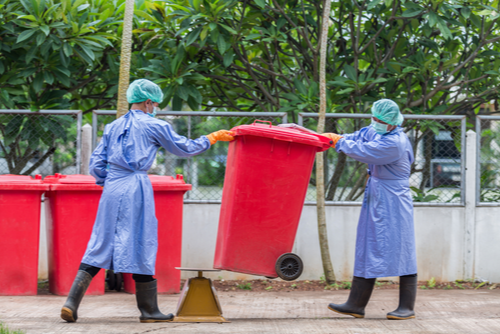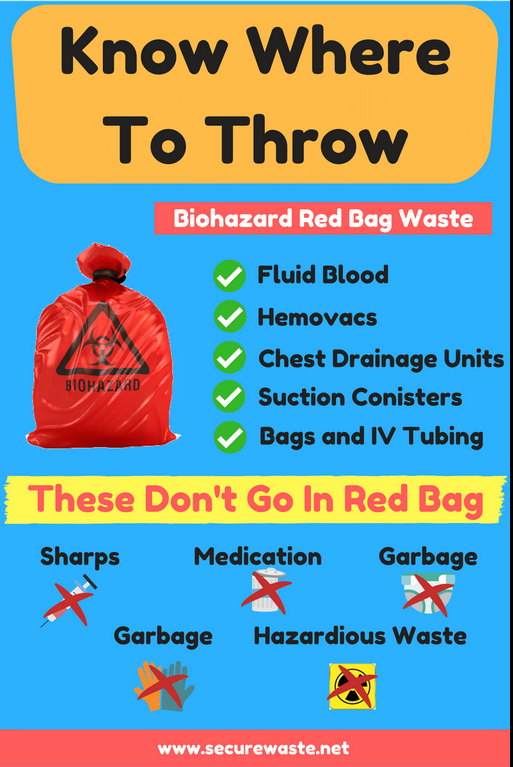Your Trusted Companion: Medical Waste Removal Services Tailored to Your Demands
Your Trusted Companion: Medical Waste Removal Services Tailored to Your Demands
Blog Article
Remain Ahead of Rules: Expert Guidance on Medical Waste Disposal
In a world where the healthcare industry is constantly advancing, it is essential for clinical centers to stay in advance of guidelines when it comes to the appropriate disposal of medical waste. From recognizing the various categories of clinical waste to carrying out the best collection and partition techniques, this discussion will certainly offer valuable understandings and actionable pointers to aid facilities remain ahead of laws in the ever-changing landscape of medical waste disposal.
Recognizing Medical Waste Categories
Recognizing medical waste categories is necessary for proper disposal and monitoring in health care facilities. Medical waste describes any type of waste created by health care tasks that may posture a danger to public health or the atmosphere. It is crucial to categorize clinical waste accurately to guarantee its safe handling, treatment, transport, and disposal.
There are several groups of medical waste that health care centers require to be knowledgeable about. One of the most common groups include contagious waste, pathological waste, sharps waste, pharmaceutical waste, and chemical waste. Each group has particular standards and regulations for its appropriate monitoring and disposal.
Pathological waste refers to human tissues, organs, or body parts that require unique handling and disposal. Drug waste consists of ended, unused, or contaminated drugs that need mindful handling and disposal.
Remaining Up-To-Date With Regulatory Adjustments
Remaining present with regulatory changes is important for health care facilities to ensure conformity and correct administration of medical waste disposal. medical waste removal near me. With laws regularly developing, it is important for healthcare centers to stay up-to-date to stay clear of charges, fines, and possible damage to the environment and public health
To remain ahead of governing modifications, healthcare centers must establish a system for surveillance and tracking updates. This can be done by subscribing to governing e-newsletters, participating in workshops and conferences, and proactively participating in sector organizations. Additionally, centers ought to mark a personnel or team liable for staying educated and distributing details to relevant stakeholders.
Normal communication with regulative agencies is likewise vital. Health care centers should develop partnerships with regional, state, and government agencies to ensure they recognize any modifications in laws that may affect their waste monitoring practices. This can be done with normal meetings, involvement in public remark durations, and proactive interaction with governing agencies.
Moreover, healthcare centers ought to take into consideration partnering with waste administration firms that focus on clinical waste disposal (medical waste disposal services with WasteX). These firms are usually fluent in the current policies and can supply advice and assistance to ensure compliance
Executing Appropriate Collection and Partition Techniques
To properly take care of clinical garbage disposal, medical care centers must establish proper collection and segregation methods in accordance with regulatory standards. Applying these approaches makes certain the safe handling and disposal of possibly unsafe products, secures the atmosphere, and minimizes the risk of infections and injuries to medical care workers and the public.
Appropriate collection and segregation methods involve the usage of marked containers and classifying systems. Health care facilities ought to provide plainly classified containers for various kinds of medical waste, such as sharps, transmittable waste, pharmaceutical waste, and non-hazardous waste. These containers need to be color-coded and plainly marked to avoid discover this info here complication and promote More about the author easy recognition.
In addition, health care facilities need to educate their staff on the correct treatments for gathering and segregating clinical waste. This includes enlightening them on the various sorts of waste, the appropriate containers to make use of, and the value of following standards and policies. Regular training sessions and refresher course programs should be performed to guarantee that team member remain updated on best methods.
Additionally, medical care facilities need to establish a system for normal collection and disposal of medical waste. This might involve partnering with accredited waste management business that specialize in medical garbage disposal. These business will certainly ensure that the accumulated waste is transferred and disposed of in compliance with governing requirements.
Selecting the Right Disposal Approaches

Incineration is one of the most typical and efficient techniques for disposing of certain kinds of medical waste, such as pathological waste and sharps. It involves the controlled combustion of waste at heats, decreasing it to ash. Incineration can release hazardous pollutants into the air and add to air contamination.

Chemical therapy entails the usage of chemicals to decontaminate and neutralize the waste. Microwave treatment utilizes microwave power to warm and sanitize the waste.
Making Certain Conformity Via Documents and Training
After carefully considering the appropriate disposal methods for medical waste, healthcare facilities must ensure compliance with regulations and minimize ecological influence by applying reliable paperwork and training procedures. This step is essential in maintaining a safe and lasting atmosphere for both healthcare workers and the basic public.

Training is similarly vital in ensuring compliance with laws. Healthcare workers who take care of clinical waste ought to get ideal training on waste partition, dealing with, and disposal procedures. This training must cover subjects such as the correct use of personal protective devices, recognition of various sorts of waste, and the correct disposal techniques for every waste classification. By giving comprehensive training, healthcare facilities can empower their staff to make educated decisions and reduce the danger of incorrect garbage disposal.
Conclusion
Finally, staying in advance of laws in clinical waste disposal is important for health care facilities. medical waste removal services. Comprehending the different categories of clinical waste, remaining updated with regulatory adjustments, carrying out appropriate collection and segregation approaches, selecting the suitable disposal methods, and making certain conformity through documents and training are all crucial steps. By following these standards, health care organizations can properly get rid of and manage of clinical waste in a risk-free and liable way
From comprehending the various classifications of medical waste to applying the best collection and partition techniques, this conversation will provide beneficial insights and workable tips to assist centers stay in advance of policies in the ever-changing landscape of clinical waste disposal. - medical waste disposal services with WasteX
The most common categories include contagious waste, pathological waste, sharps waste, pharmaceutical waste, and chemical waste. Medical care centers need to provide clearly labeled containers for different types of medical waste, such as sharps, contagious waste, pharmaceutical waste, and non-hazardous waste. Health care centers must develop a thorough system to videotape and track all facets of clinical waste disposal, consisting of kinds of waste created, amounts, and disposal approaches made use of. Medical care employees that manage clinical waste must get proper training on waste segregation, dealing with, and disposal procedures.
Report this page